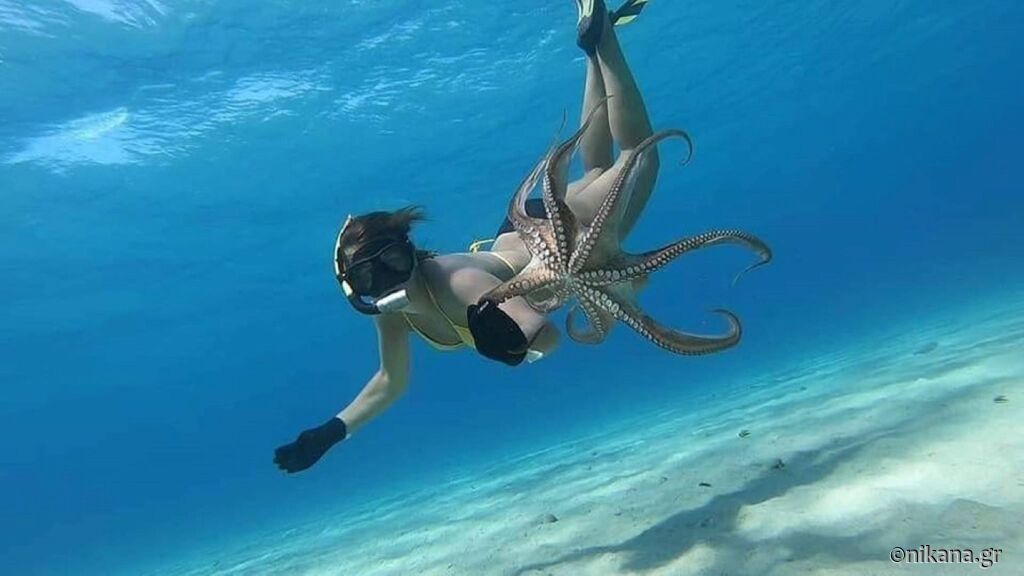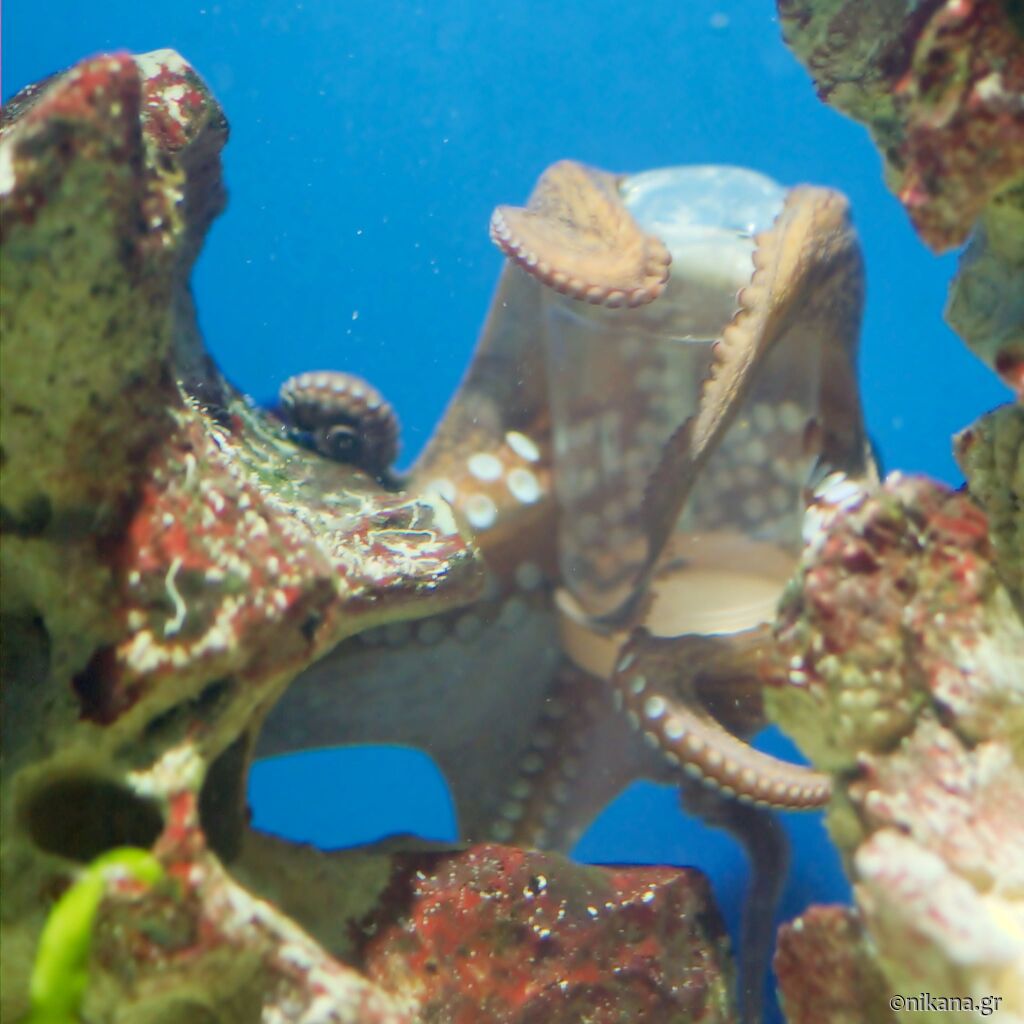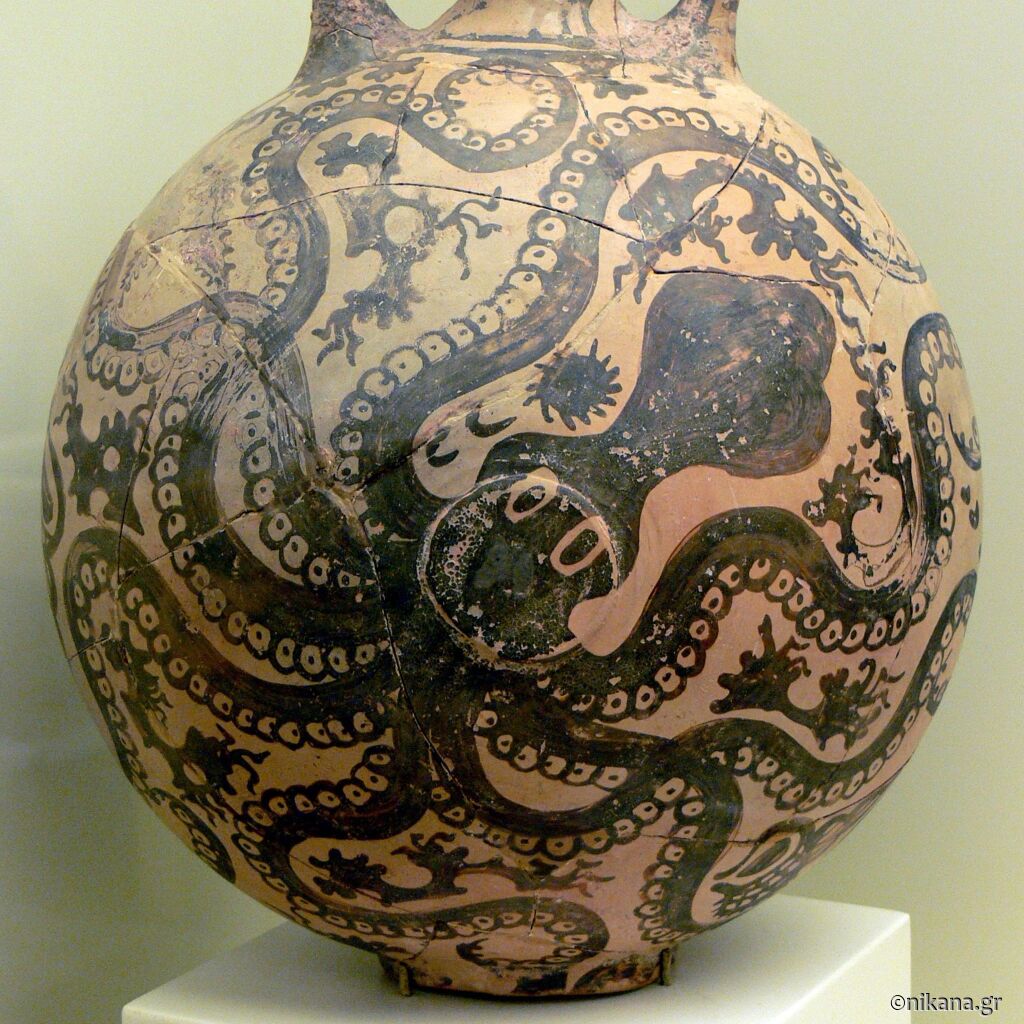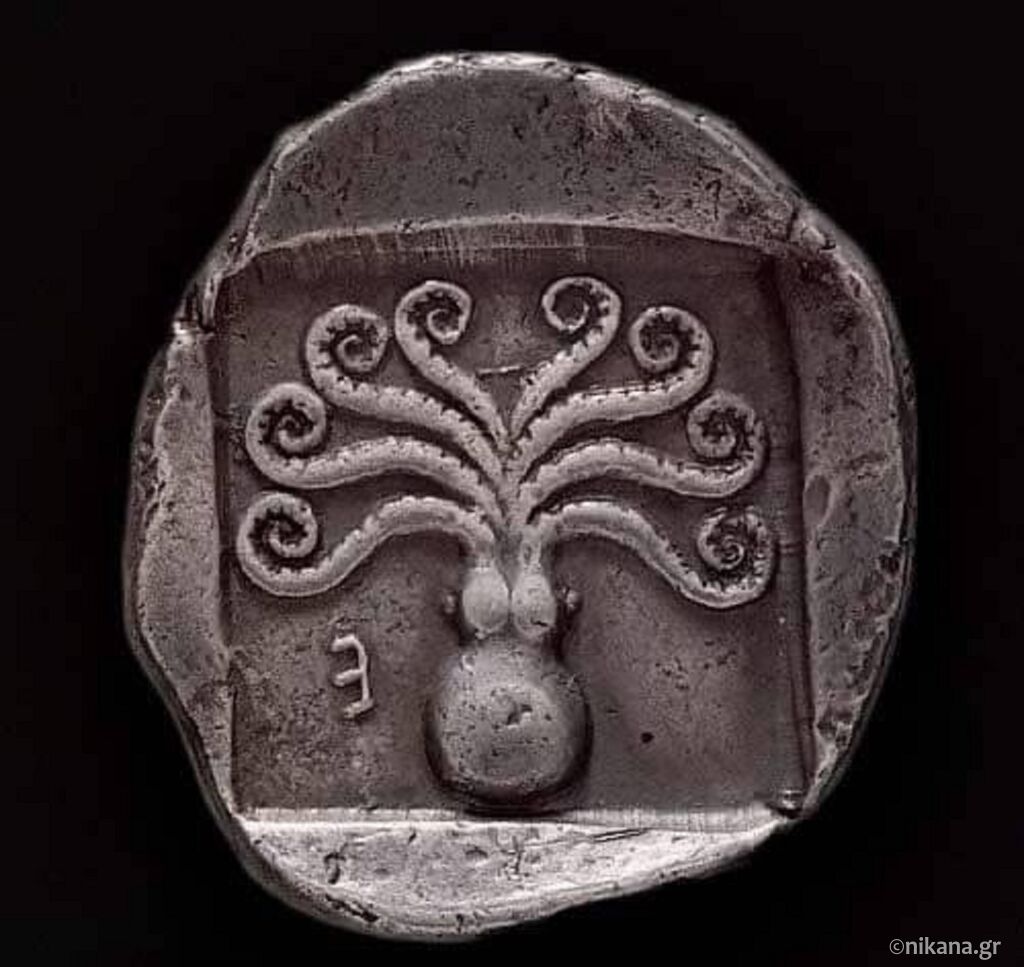Octopuses: Sentient Beings with Feelings That Deserve Our Attention
Did you know that octopuses have three hearts, blue blood, and emotions?
In the places where we vacation, we often encounter them in shallow waters, in pictures from diving tours, or - on the menu of restaurants. But behind their unusual appearance lies a world that we are just beginning to understand. Recent research reveals that octopuses are not only intelligent but also sentient beings - capable of experiencing fear, curiosity, and even attachment.
These discoveries not only shift our perception of the marine world but also the way we should treat these fascinating creatures - both in nature and in industry.
In this text, we delve into their incredible abilities, explore octopuses from the perspective of science and ethics, as well as address important questions concerning their protection. Because a seaside vacation can bring not only relaxation but also new knowledge - and a deeper respect for life beneath the surface.
Meet the octopus: a remarkable creature of the deep sea
Octopuses are fascinating creatures belonging to the order Octopoda, in the group of cephalopods. They mostly inhabit warm and temperate marine waters, from shallow coastal areas to the depths of the ocean. We mostly find them hidden in rocky crevices, caves, and sandy seafloors, where they can easily camouflage.
What makes the octopus almost extraterrestrial are a series of biological traits not commonly seen in the animal world:
Three hearts - two pump blood to the gills\, while the third heart sends oxygenated blood to the rest of the body. Interestingly\, this third heart stops when the octopus swims.
Blue blood - instead of hemoglobin\, their blood uses hemocyanin to transport oxygen\, which contains copper and gives the blood a blue color.
Tentacles with their “brains” - two-thirds of an octopus’s neurons are in its eight tentacles. Each of them functions almost autonomously\, with the ability to explore\, feel\, and decide without the central brain’s involvement.
Short but intense lifespan - most species live between one and two years\, with some larger specimens\, like the Pacific giant octopus\, living up to five years.
Octopuses have a brief yet magnificent parenthood
Octopuses live a short but intense life. Most species survive only one to two years, with their entire life leading to one goal - reproduction.
After mating, the male soon dies, quietly withdrawing from life once it passes on life.
Here is how it works:
After the male transfers a sperm packet (capsule with sperm) to the female, his biological role ends.
In the days or weeks after mating, the male slowly weakens, stops eating, and eventually dies.
Just like females, males activate a biological mechanism of programmed death (known as apoptosis in specific parts of the brain), which is common in species that reproduce only once in their lifetime (semelparous species).
The female remains alone to care for the offspring, devoting her entire being to it. In caves, crevices, or artificial shelters, she guards thousands of eggs, never leaving them even for a moment to eat. She expends all her energy on protecting and ventilating the eggs until the offspring hatch. Then, exhausted and hungry - she dies.
The life of an octopus is gentle and quiet, ending in complete dedication. There is no other offspring, no new beginning. There is only one cycle, one act of love and sacrifice.
Why are octopuses special?
Octopuses are among the most intelligent and fascinating creatures of the deep sea. Their nervous system is among the most developed among invertebrates, and interestingly, most of their neurons are not in the brain but in the tentacles! This unique anatomy allows them to function almost like “little brains” in each tentacle - they can perform complex tasks, react to external stimuli, and control movements with astonishing precision.
Some of the most interesting behaviors of octopuses include:
Self-awareness: Octopuses are among the very few animals that recognize their reflection in a mirror, a sign of their self-awareness.
Tool use: These animals are not just hunters - they use tools! For instance, they use stones to crack open shells or to protect their den from predators.
Learning and memory: Octopuses have the ability to learn from their experiences, even from other octopuses. This ability is crucial for their navigation in complex environments.
Problem-solving: Octopuses are not just innocent creatures swimming through the sea. They can open containers or navigate through mazes to reach food, showcasing their logical thinking and planning abilities.
Collaboration with other species: In some cases, octopuses even collaborate with other animals in hunting, such as teaming up with groupers to catch prey. Their ability to interact and adapt in the ecosystem further emphasizes their complexity.
Recognition of people: Octopuses have developed optical lobes and can recognize human faces, forming specific relationships and bonds with people in terms of attachment or aversion. In a study by the University of Otago, one octopus regularly sprayed water on a person it clearly “disliked,” even though all staff members wore the same uniform. (Source: Scientific American, “Are Octopuses Smart?” (author: Ferris Jabr, 2013). Similar abilities are seen in dogs, cats, dolphins, sheep, and crows.
Not just marine creatures
Octopuses are not just wondrous creatures moving through the water - their intelligence and ability to adapt and survive in a world with numerous threats make them a true marvel of nature. Based on numerous scientific studies, octopuses are ranked among the most intelligent invertebrates on the planet, continually surprising researchers.
One example of their uniqueness comes from an experience shared by one of our members. During a visit to an aquarium in Corfu, the guide mentioned they had an octopus that was exceptionally fond of humans. The member paid attention to it, and when she took out her phone to photograph it, the octopus looked her straight in the eyes and then “posed” - as if it was modeling! This moment is a beautiful representation of their awareness and unusual ability to interact with humans.
Octopuses in Greek mythology
Minoan culture and octopuses: Octopuses played a significant role in the art of the Minoan civilization, which thrived on Crete. For example, one of the most famous finds is a vase from around 1500 BCE, covered with black and white depictions of octopuses. This motif likely served as a symbol of fertility, sea power, and protection. Source: “Minoan clay vase with octopus decoration, c. 1500 BC”
Coins and octopuses: Octopuses also appeared on coins as a symbol of maritime power and dominance. These coins date back to around 1650 BCE, when the Minoans used octopus images as symbols of the sea’s strength and mystery. This coin is part of the numismatic heritage that depicts the significance of octopuses in daily life, as well as their role in mythological and everyday settings. Source: “Coins from Minoan civilization” (Various numismatic research articles).
Octopus symbolism in Greek mythology: In Greek mythology, the octopus was not just a symbol of the natural world but was also connected to powerful sea gods like Poseidon, the god of the sea, who was associated with the forces of nature and the unfathomable depths. The octopus also inspired mythological creatures like the Hydra (with many heads). In the Greek context, the octopus represented resourcefulness and intellectual power, becoming a symbol of wisdom and ingenuity, as shown in stories about Odysseus, whose epithet “polymetis” signified his ability to confront sea dangers with intelligence. Source: “Octopus Symbolism in Greek Mythology” (Found in academic studies about Greek mythology and symbolism).
The importance of modern scientific discoveries
The Cambridge Declaration on Consciousness, signed by over 400 leading scientists in 2012, officially confirmed that many animals, including octopuses, possess the same neurological foundations that enable consciousness. According to this document, self-awareness is not solely attributed to humans - many species, such as mammals, birds, and octopuses as the only invertebrates (for now), have neurological structures that allow them to be aware of their existence.
Eminent scientists who signed the declaration include Stephen Hawking, physicist, Jane Goodall, biologist and ethologist (a scientist who studies animal behavior), David Attenborough, renowned naturalist, and many others.
Octopuses are the only invertebrates recognized for their advanced cognitive abilities, although other species such as squids and cuttlefish are not far behind.
Legal measures for protecting octopuses
Considering scientific discoveries, some countries have begun to introduce legal regulations.
United Kingdom: In 2021, under the Animal Welfare Sentience Act, octopuses were officially recognized as sentient beings. This recognition entails protection from cruelty, inhumane experiments, and unnecessary killing.
European Union: Directive 2010/63/EU on the protection of animals used for scientific purposes includes octopuses. This regulation requires special ethical approvals for experiments and strictly limits their use.
Spain: In parts of Spain, such as the Canary Islands, laws on marine conservation provide additional protection for octopuses.
Croatia: Discussions are ongoing in Croatia for additional measures to protect marine species, including octopuses, with a particular focus on their hunting and habitats.
United States: Massachusetts has initiated initiatives to protect marine species, including octopuses, through stricter habitat conservation rules and ethical standards in aquariums.
Bans on exposure and exploitation: In some jurisdictions, octopuses are protected by laws that regulate their exposure to poor conditions and use in experiments without specific ethical approvals. Moreover, more regions are implementing measures to protect their habitats from overfishing.
Hunting and gastronomy: octopuses in Greece
In countries like Greece, octopuses are favorites in gastronomy and are often served in traditional taverns. Their hunting has a long history and deep roots in local culture. However, increasing demand and mass harvesting seriously endanger their populations.
The ethics of their use are becoming an increasingly prevalent topic, especially considering their ability to feel pain and complex behavior.
The question that arises is whether octopuses should be part of culinary experiences, or if more sustainable and humane alternatives should be sought?
Global challenges: preserving the seas and biodiversity
Octopuses, like many other species, face serious threats. Data indicates that:
90% of populations of large fish have disappeared in the last 50 years.
By 2050, we could lose almost all fish from the seas.
96% of all mammals are humans and animals raised for food, with only 4% being wild species.
These figures remind us of the urgency of preserving marine ecosystems, in which octopuses play a crucial role.
Why conserve octopuses and other species?
Global octopus catch amounts to around 420,000 tons annually. While efforts are being made in some countries, such as Croatia, to repopulate them, habitat conservation and prevention of overfishing remain critical.
Every species, from octopuses to large fish, plays an irreplaceable role in the balance of marine ecosystems.
Why is this important?
Octopuses are the first invertebrates with legal protection, but their example can inspire broader protection of other species. Dolphins, elephants, pigs, and intelligent birds like crows exhibit emotional and cognitive complexity that calls for their protection. Understanding their consciousness changes our relationship with animals.
While positive changes in legislation are evident, many challenges lie ahead. The next time you think of octopuses, remember: they are more than mere ingredients in a dish - they are aware, sentient beings deserving of our attention.
We are always here to help you explore Greece! Follow us for the latest information, useful tips and authentic experiences to spend an unforgettable vacation in Greece!
We offer over 3,000 accommodations. Choose the right one for you and your family HERE.
Follow us on social networks where we regularly share exclusive offers, discounts and special arrangements for vacations in Greece as well as information, advice and useful news.
Facebook:Nikana.gr
Instagram: @nikana.gr
Tiktok: nikana.gr
Facebook grupa: Live from Greece
YouTube kanal @NikanaTravel
Write to us at e-mail: nikana@nikana.gr
Our site nikana.gr is the leading source of information about Greece.
Images:
-By Wolfgang Sauber - Own work, Public Domain, https://commons.wikimedia.org/w/index.php?curid=6528973
-By User:MatthiasKabel - Own work, CC BY 2.5, https://commons.wikimedia.org/w/index.php?curid=57398993
-By Un-chan (운짱) - http://photo.naver.com/view/2016060314512818620, CC BY-SA 2.0 kr, https://commons.wikimedia.org/w/index.php?curid=51326118













Post a Comment
NOTE
All your questions in the comments will receive an answer via email so check your inbox shortly after you posted comment. For more detailed questions and responses, contact us via mail nikana@nikana.gr.